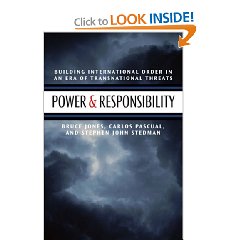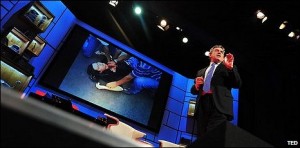
![]() Bubba Book
Bubba Book
January 6, 2010
Bruce Jones, Carlos Pascual, Stephen John Stedman
EDIT of 7 Jan 09. I got halfway through another book last night and now understand the Princeton-based idea that the US has enough power to demand changes and that earlier “balance of power” constraints might not apply. On the one hand, this is an idea worth pursuing, but if you know nothing of strategy, intelligence (decision-support) and how to integrate Whole of Government and Multinational Engagement campaigns against the ten threats by harmonizing the twelve policies and engaging the eight demographic leaders, then this is just academic blabber. On the other hand, this is 100% on the money–if the USA were a Smart Nation with an honest government, now is the time to lead–but it's not going to come out of the ivory tower or politicals in waiting for their next job, it will come from the bottom (Epoch B), the poor, and the eight demographic powers (Brazil, China, India, Indonesia, Iran, Russia, Venezuela, and Wild Cards such as South Africa, Thailan, and Turkey, with the Nordics and BENELUX always lurking positively on the fringes.
Original review:
I tried hard to find enough in this book to warrant five stars, but between the pedestrian threats, buying in blindly to the climate change fraud, assertions such as “There is no prospect for international stability and prosperity in the next twenty years that does not rest on U.S. power and leadership,” and the general obliviousness of the authors to multiple literatures highly relevant to their ostensible objective of answering the question “how do we organize our globalized world,” this has to stay a four. It has some worthwhile bits that I itemize below, but on balance this is an annoying book, part cursory overview, part grand-standing proposals for new organizations, and part job application–at least one of these authors wants to be the first High Commissioner for Counter-Terrorism.
Although the authors are familiar with A More Secure World: Our Shared Responsibility–Report of the Secretary-General's High-level Panel on Threats, Challenges and Change, which was published in 2004, this book does not resonate with the ten priorities set forth there, in this order:
01 Poverty
02 Infectious Disease
03 Environmental Degradation
04 Inter-State Conflict
05 Civil War
06 Genocide
07 Other Atrocities
08 Proliferation
09 Terrorism
10 Transnational Crime
Had the author's actually sought to tailor their suggestions to the above elegant threat architecture, this could have been a much more rewarding book. As it is, it strikes me as a book written around a few ideas:








